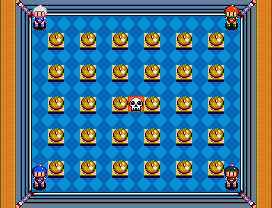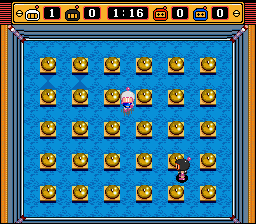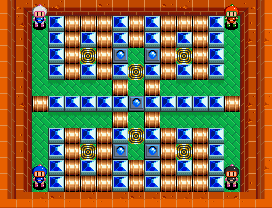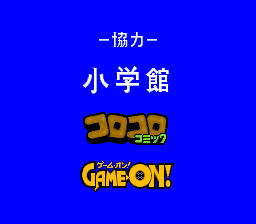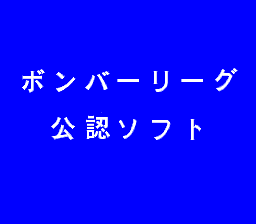Super Bomberman 2
| Super Bomberman 2 |
|---|
|
Developer: Produce
|
Bomberman must fight against 5 evil Bombermans. Bombermen. Bomberpeople?
Contents
Debugging Functions
CPU Usage Meter
A CPU usage meter can be toggled when the Pro Action Replay (PAR) code C100BF01 is active.
Normal Game Jumping
The Pro Action Replay (PAR) code C13D2801 will allow Bomberman to jump in the Normal Game.
Power-Up Toggler
A 1-Player debugging function can be accessed through the following Pro Action Replay (PAR) code: C022F301.
In a 1-player game, pressing the R button will give the following power-ups:
- Max Bombs
- Max Flame
- Max Skates
- Remote Bombs
- Bomb-Through
- Wall-Through
- Kick
- Throw
- And finally, a whopping 144 Hearts!
Soft Reset
Use Pro Action Replay (PAR) code C0FCAF01 to enable a soft reset function. When the game is paused, hold Select and then press Start to restart the game.
Hidden Battle Stages
Two battle stages are hidden in the game. Both of these stages use the 3rd battle theme, a track that can only be heard through normal play in Battle Stage 4.
The "official" method of accessing these stages is to plug in a Hudson Super Joycard controller, turn on the turbo-fire feature, and hold X for several seconds. Using the codes listed below is a highly recommended alternative.
Stage 11
Use Pro Action Replay (PAR) code 7E1CCD:0A to access this stage, which seems to take place in a boxing ring.
In this stage, all players are fully powered-up at the start. There are no walls, and the only power-up is the skull in the center.
The sides of the ring can be used to propel players forward.
Stage 12
Use Pro Action Replay (PAR) code 7E1CCD:0B to access this stage. Note that both Stage 11 and Stage 12's digits use a different palette than the normal stages (orange rather than silver).
A standard battle arena, though the trampolines don't appear anywhere else in Battle Mode. The gem blocks will kill the player when walked on.
Early Power-Up Icons
Taken from an earlier version of the power-up set found in the ROM.
Fire Extinguisher
| Super Bomberman | Super Bomberman 2 |
|---|---|
The fire extinguisher power-up from Super Bomberman was set to appear again. Its graphics were updated, but it was ultimately discarded.
Glove
| Early | Final |
|---|---|
The black dots on the fingers of the gloves aren't present in the earlier version.
Ice Cream Cone
| Super Bomberman | Super Bomberman 2 |
|---|---|
A different ice cream graphic, based on the one from the first game. The final game uses an entirely different design.
Spike Bomb
| Early | Final |
|---|---|
A very nitpicky change, but a few pixels on the upper-left were changed.
Amusingly, the sprite set for a Spike Bomb falling off a stage still uses this older design.
Filler Icons
Four filler icons. Featuring a tiny Bomberman, a crap, a frog, and Dr. Mook (one of the main villains from Super Bomberman). The text says "mada", which means "not yet".
Unused Power-Up Icons
Discarded power-ups from the final version of the tileset.
Clock
| Super Bomberman 2 | Super Bomberman 4 |
|---|---|
A clock power-up, which would either reset the clock or freeze monsters. This would show up again, with minor changes, in Super Bomberman 4.
Question Mark
A question mark icon. Question mark icons appeared in the original NES Bomberman, where they granted the player invincibility against enemies for the remainder of the stage. It's unknown if they were meant to serve the same function here, though.
Vest
An unused flameproof vest power-up. Naturally, this would have protected Bomberman against explosions.
Unused Enemy Sprites
These unused animations can be found among the rest of the graphics for the Mr. Moai enemy. In the game, it only moves around aimlessly, but these sprites imply that it had a secondary behavior at some point in development, in which it would have opened its mouth and stuck out its tongue.
Unused Font
A font that is always loaded in VRAM, but never used.
Unused Music
While not entirely unused, parts of different tracks cannot be heard in normal play.
Intro
Only the first 39 seconds are heard in the intro. The whole song is 1 minute and 23 seconds, and it even loops!
Map
6 seconds of this 20 second piece are heard in the game, and it also loops.
Unused Sound Effects
A sped up voice saying "Power," similar to the voice that says "Kick" when a Bomb Kick item is collected. This may have been intended for when the Power Glove or Power Bomb items are picked up, but in both cases a generic sound is used instead. Changing the values at 0x9BF7 and 0x9C3B in the US ROM to 0x60 will replace the collection sounds with this sound for the Power Glove and Power Bomb, respectively.
Although this exact sound effect is not used, the sample it plays is--it's the weird squeaky sound you hear in a few music tracks, like the first Battle Game theme.
Unused Palettes
There are several alternate palettes for sprites used in the game that seem to suggest that the Normal Game was intended to be multiplayer as well as single player, just as it is in other installments of the series.
Robo Bomber
Brain Bomber, boss of the fourth stage in the Normal Game, normally pilots a giant robotic counterpart to White Bomberman. Palettes for a black version exist as well. In a two player game, White and Black Bomberman may have faced off against two Robo Bombers, the second using these palettes.
Ending
Palettes for the other three major Bomberman colors being ejected into space after the Dark Stage base explodes. This could either be evidence of an earlier storyline where these three Bombermen are captured along with White by the Dastardly Bombers, or a four player Normal Game.
Palettes for Black, Red, Blue Bomberman falling back to Earth, as White Bomberman does in the next-to-last screen in the ending.
Unused Text
Debug Menu
Debug text can be found in the ROM. While not as extensive as the menu in the first game, it's still something. This text maps to the unused font above, and starts at 0x16068 in the ROM.
NORMAL GAME BATTLE GAME STAGE NO. 0-0 NO DEATH OFF FIRE 0 BOMB 0 BOMB TYPE 0 ITEM FULL OFF - 0123456789 ONOFF
Version Differences
Japanese Version
This block of text is only seen in the Japanese version's credits. It is located before the director credit.
Special thanks to all our
friends for giving us
these names:
"PLASMA BOMBER"
AKIHIRO NISHIDA
and 3 other kids
"MAGNET BOMBER"
TATSUYA SHIRAI
and 63 other kids
"BRAIN BOMBER"
YOSHINAO KAWAI
and 4 other kids
"PRETTY BOMBER"
KAZUMA ASAKURA
and 21 other kids
"GOLEM BOMBER"
HIROKAZU TAKADA
and 2 other kids
English Versions
| To do: There are likely more differences we don't know about. |
- There is a 253-frame delay before the game can select a game mode on the main menu. In the Japanese versions, it is 31 frames.
Caravan Version
A special edition version of the game was released in Japan only. It, much like the special versions of Bomberman '93 and '94, is focused on fast multiplayer action... by way of removing features.
- Two screens were added before the intro story. The first screen gives acknowledgement to the event's sponsor, Shogakukan, and two of its publications, CoroCoro Comics and Game On!, while the second screen proclaims the game "Official Bomber League Software."
- The Battle Type and Battle Settings screens are completely disabled, but they still exist in the game code. It's still possible to alter the settings via patch codes.
- The Battle Type is locked on Single and and the Battle Settings are locked to COM Level 5, Matches (Battle) 1, Time 2:00, and Golden Bomber off.
- All stages have been removed aside from 01 (Usual), 08 (Conveyor Belt II), 09 (Curve Bomb!), and 10 (Matango Jump).
- The stage numbers have been changed to reflect the removal of stages; Stage 08 became 02, 09 became 03, and 10 became 04.
- Forcing the game to select Stage 11 or Stage 12 still displays the number in orange, but defaults to Stage 04.
- The Trophy screen is skipped after a match, except in the case of forcing a Tag Battle.
- The Hurry Up phase starts at 1 minute remaining, rather than the final 40 seconds.
- Pages missing developer references
- Games developed by Produce
- Pages missing publisher references
- Games published by Hudson Soft
- Games published by Nintendo
- SNES games
- Super Famicom Box games
- Pages missing date references
- Games released in 1994
- Games released in April
- Games released on April 28
- Games released in December
- Games released on December 12
- Games with unused areas
- Games with hidden development-related text
- Games with unused graphics
- Games with unused items
- Games with unused music
- Games with unused sounds
- Games with debugging functions
- Games with regional differences
- Games with revisional differences
- To do
- Bomberman series
Cleanup > Pages missing date references
Cleanup > Pages missing developer references
Cleanup > Pages missing publisher references
Cleanup > To do
Games > Games by content > Games with debugging functions
Games > Games by content > Games with hidden development-related text
Games > Games by content > Games with regional differences
Games > Games by content > Games with revisional differences
Games > Games by content > Games with unused areas
Games > Games by content > Games with unused graphics
Games > Games by content > Games with unused items
Games > Games by content > Games with unused music
Games > Games by content > Games with unused sounds
Games > Games by developer > Games developed by Produce
Games > Games by platform > SNES games
Games > Games by platform > SNES games > Super Famicom Box games
Games > Games by publisher > Games published by Konami > Games published by Hudson Soft
Games > Games by publisher > Games published by Nintendo
Games > Games by release date > Games released in 1994
Games > Games by release date > Games released in April
Games > Games by release date > Games released in April > Games released on April 28
Games > Games by release date > Games released in December
Games > Games by release date > Games released in December > Games released on December 12
Games > Games by series > Bomberman series


